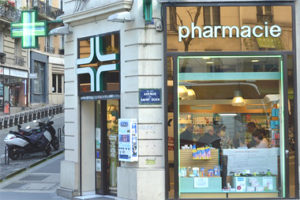Are pharmaceutical products complementary to trade fairs and training courses in the health care sector? The Court of Justice of the European Union denies this, but sees a connection between medical services and pharmaceutical products: a two-part judgment in the trademark dispute EMCUR versus EMCURE.
Pharmaceutical products EMCUR versus services EMCURE
 Plaintiff Emcur Gesundheitsmittel aus Bad Ems GmbH has been the trademark owner of the EU word mark EMCUR (No. 1 962 232) since 2002 and of the German word mark EMCUR (No. 30 2012 046 049) since 2012. In October 2013, the defendant Emcure Pharmaceuticals Ltd. filed the EU word mark EMCURE, which was announced in March 2014. The difference between the two marks lies in principle between goods (“EMCUR”) and services (“EMCURE”) and – as a result – in different Nice classes for which they were registered. EMCUR of the plaintiff is registered in Class 5 “Pharmaceutical products” and Class 10, EMCURE of the defendant was registered for Classes 35, 41, 42, 44 and 45 – including “Medical training, publications and advertising measures for pharmaceutical, pharmaceutical research and medical services”.
Plaintiff Emcur Gesundheitsmittel aus Bad Ems GmbH has been the trademark owner of the EU word mark EMCUR (No. 1 962 232) since 2002 and of the German word mark EMCUR (No. 30 2012 046 049) since 2012. In October 2013, the defendant Emcure Pharmaceuticals Ltd. filed the EU word mark EMCURE, which was announced in March 2014. The difference between the two marks lies in principle between goods (“EMCUR”) and services (“EMCURE”) and – as a result – in different Nice classes for which they were registered. EMCUR of the plaintiff is registered in Class 5 “Pharmaceutical products” and Class 10, EMCURE of the defendant was registered for Classes 35, 41, 42, 44 and 45 – including “Medical training, publications and advertising measures for pharmaceutical, pharmaceutical research and medical services”.
The applicant filed an opposition against the registration of the trade mark of EMCURE on the grounds of likelihood of confusion under Article 8(1)(b) of Regulation No 207/2009 and argued that, in the field of healthcare, pharmaceutical products such as EMCUR were complementary to services under an almost identical name to EMCURE. Moreover, the target consumers for the goods and services in question are generally the same, in particular pharmaceutical companies, health organisations, patient associations and pharmacies in addition to patients and doctors. After the EUIPO Board of Appeal rejected the appeal, the case was referred to the Court of Justice of the European Union (CJEU).
Complementary goods or services must be indispensable to each other
In its judgment, the European Court of Justice pointed out in principle that complementary goods or services are those which are closely related, in the sense that one is indispensable or important for the use of the other. Ultimately, consumers could think that the same company is responsible for the production of these goods or the provision of these services. In order to clarify whether that was the case in the present case, the Court examined in detail the individual service classes for which the contested word mark EMCURE had been applied for.
Trade fairs and further pharmaceutical training are not complementary
The services of Class 35 include, inter alia, “Organisation of exhibitions, fairs, seminars and other events for commercial or advertising purposes” and Class 41 “Training and further education in the pharmaceutical and medical fields; organisation of workshops”.
The applicant argued that trade fairs, seminars and workshops in the field of health care were aimed at providing information on certain diseases or disorders and their prevention and treatment. Therefore, the services covered by the mark applied for and the pharmaceutical products covered by the earlier marks EMCUR would complement each other and in some cases even the handling of pharmaceutical products and preparations for health care would be learned, according to the applicant.
However, the court makes it clear that the use of a medicinal product is not indispensable or important for the provision of a publication service in the pharmaceutical and medical sector. Conversely, the provision of a publication service for the use of a medicinal product is not essential or important. In addition, taking medication does not require participation in health services.
It is therefore not the case here that the use of the service is indispensable for the product.
Moreover, the goods and services in question also differ in their purpose, since a medicinal product and the treatment of diseases are by no means similar to a service for commercial, advertising and promotional events. The distribution channels for the goods and services in question are also completely different, since pharmaceutical products are available in pharmacies or specialised healthcare facilities. They are therefore neither in competition with each other nor do they complement each other, the CJEU ruled.
Pharmaceutical research and medical services are complementary
The court assessed the entries in Class 42 “Pharmaceutical Research” and Class 44 “Medical Services” differently. The applicant argued that it was necessary to carry out pharmaceutical research prior to the market launch of a medicinal product. The court endorsed this view and confirmed a fundamentally close connection between pharmaceutical products and pharmaceutical research.
Likewise, Class 44 medical services are complementary to Class 5 pharmaceutical products, the European Court ruled. Some of the medical services are important, even indispensable, for the use of these goods. (Judgment of 2 June 2010, Procaps/HABM – Biofarma (PROCAPS), T-35/09, not published, EU:T:2010:220)
Important judgement in the field of pharmaceutical products
The judgment is therefore two-sided. The opposition against the trademark registration for the events in the commercial sector and also for the further education sector of the classes 35 and 41 was rejected. But the opposition to the registration for research and medical services in classes 42 and 44 was upheld by the Court of First Instance, thus annulling the decision of the Board of Appeal in respect of those two classes. Manufacturers of pharmaceutical products should therefore take into consideration that at least the important area of further training should be included in the trademark registration of your products.
Do you want help for trademark application or protection for your brands?
Or do you need help in healthcare & life sciences?
Our Patent Attorneys and Attorneys at Law bundle are experts in patent- and trademark law, national and international.
Please take your chance and contact us – a request for a call-back is non-binding:
Sources:
Curia Europe: EMCUR vs EMCURE EU:T:2018:346
Picture:








Leave a Reply